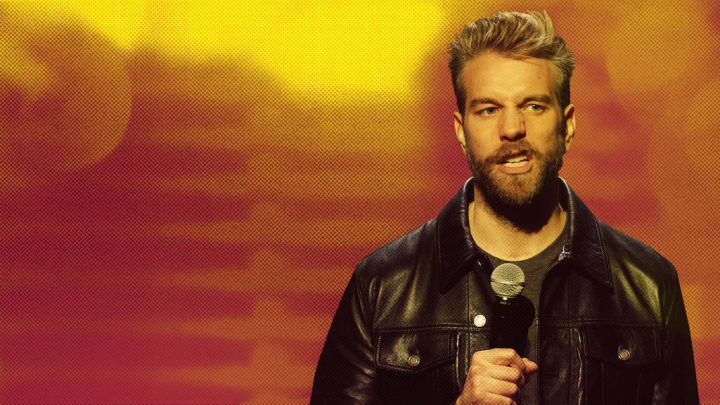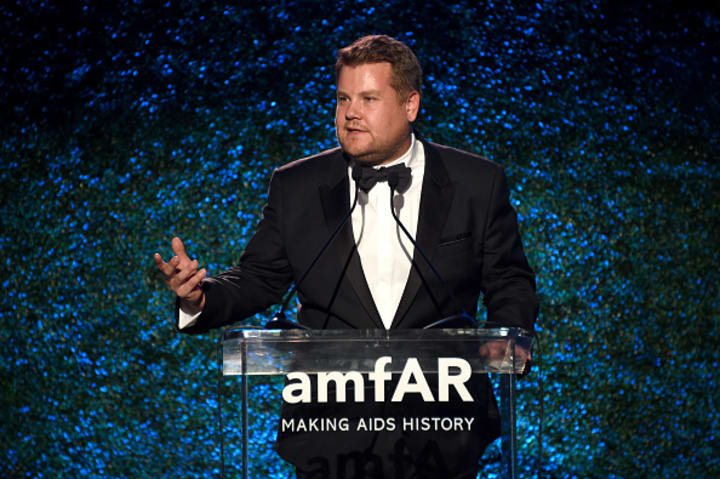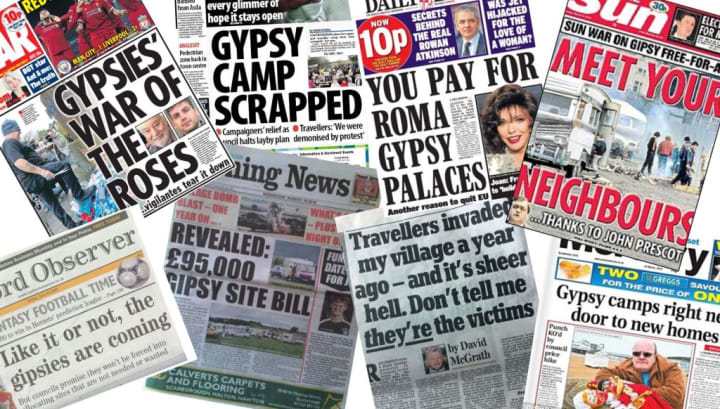Bad Jokes - A reluctant defence of Jimmy Carr
Matthew Hayhow examines the backlash to Jimmy Carr's controversial joke

TW: racism, anti-Semitism, homophobia, transphobia, sexual assault, a picture of Bernard Manning
“My mom, for most of her life, was a Holocaust denier. And it was terrible for the entire family to have to deal with until, finally, a couple years ago, we had an intervention. And we had a rabbi come into the home, had him walk her through the history of the Jewish people, and then he made her watch “Schindler’s List.” And after that, my mom did a complete 180. Now she can’t believe it only happened once.”
This is a joke from Anthony Jeselnik’s special Caligula. This is one of my favourite jokes and I don’t think I have ever shared this joke with anyone who didn’t laugh at it.
Why is it a great joke? It should be fairly self-evident what’s funny about the joke but let’s go into it. Like all jokes, there is a set-up, and a punchline. The joke sets up a situation:
A family is trying to get a mother to believe in the Holocaust to stop her being anti-Semitic.
And there is a subversion of expectations:
The mother ends up believing in the Holocaust, but the family’s efforts backfire as it only makes her more anti-Semitic.
This is what makes it fundamentally a joke, but why is this joke funnier than most? Well, first of all, I find the idea of someone putting in a lot of effort in order for it to fail funny. Think about Laurel and Hardy in the film The Music Box getting a piano up a steep flight of stairs in order for it to roll all the way back down again. If you don’t get why that’s funny then stop reading now because you’re never going to understand humour.
Of course that isn’t the only element to the joke. It’s, of course, an example of ‘dark humour’ and what makes it dark is at its core there is quite an offensive and disturbing suggestion - learning about the plight of the Jewish people can lead you to believe that the Jews deserved to die in the Holocaust. That is such a horrendous thought I felt gross even typing that out. But that’s what gives that joke its power; you’re not just laughing at the mathematics of the joke, and the joke’s narrative about failure, but the completely unexpected punchline which reveals a real darkness to the character of the mother, and by extension possibly a lot of other people. This doesn't sound very funny, but as E.B. White once said, "Explaining a joke is like dissecting a frog. You understand it better but the frog dies in the process."
Does this joke containing an anti-Semitic idea make it an anti-Semitic joke? Well, what do we mean by an anti-Semitic joke? If you believe it is, is the joke itself anti-Semitic or is it anti-Semitic by way of what it says about the teller and anyone that laughs at it?
I don’t think Anthony Jeselnik is an anti-Semite. I could mention that he dated Amy Schumer and has worked with and shared a stage with plenty of Jewish comics, but already I can hear that rebuttal that many racists can be courteous in their professional lives but can personally hold despicable opinions. How does he get away with it then?
Anthony Jeselnik is a comic that specialises in dark comedy and offensive humour. His whole stage persona is that of an amoral, cynical man who can and will joke about anything. That is, to borrow a term from Yiddish comedy, Jeselnik’s whole shtick. He creates a space in which there are expectations that taboo topics will be discussed and boundaries will be crossed that will provoke and make the audience uncomfortable but that doesn’t mean the performer is like that in real life. He’s not being didactic or trying to get you to change your mind about anything. He is telling jokes. He is quite literally - joking.
The joke then, is very dependent on this context. But what does it say about the audience who laughed at the joke? Do they all hate Jews? Firstly, you can’t blame someone for laughing at the joke. Our monkey brains for some reason enjoy stories where the ending is novel and unexpected, even if the subject matter itself is offensive and taboo.
But after this initial reaction, why didn’t people storm out the theatre at the joke’s horrible implications, and what does it say about the network that heard these ‘statements’ and decided to air them anyway? And what does it say about me who continues to spread the joke?
Again I could mention that the special was recorded in Chicago so there were probably Jewish people in the audience, who didn’t walk out. And the network that broadcast it, the New York-based Comedy Central, who work with a lot of Jewish comics, probably don’t believe that the Holocaust was a good thing either. So what gives?
Well, this is the network that gave us South Park, Chappelle’s Show and the Comedy Central Roasts. They and we understand that there is a comic tradition of making jokes from taboo subjects in order to shed light and provoke introspection on them, without the people affected by the topic necessarily being the butt of the joke themselves. Similarly when I tell this joke to people I’m not telling them the joke because I think they are racist and will appreciate hearing some racism. If anything it’s the opposite; I am more inclined to tell it to people who will understand that the joke is shocking, because then it will get more of a laugh from them. The joke won’t work as well if you tell it to a Klansman because they won’t understand what’s so wrong about it.

Which brings us to Jimmy Carr. In a week where the head of the UK government is under criminal investigation and geopolitical tensions are rising between multiple nuclear powers, the main character on Twitter has been Jimmy Carr, who two months ago released a comedy special on Netflix called His Dark Material which contains the following joke:
“When people talk about the Holocaust, they talk about the tragedy and horror of 6 million Jewish lives being lost to the Nazi war machine. But they never mention the thousands of Gypsies that were killed by the Nazis. No one ever wants to talk about that, because no one ever wants to talk about the positives.”
In the last few days my twitter feed has been filled with the same take, including some accounts I usually agree with on most things such as Owen Jones and Ash Sarkar. The take can seem to be broken up rather nicely into three apparently obvious truths:
1. Jimmy Carr is a racist for telling this joke
2. The audience are racist for laughing at this joke
3. The special should be taken off Netflix
Okay. Let’s start with the first one. I have a lot of thoughts on Jimmy Cardd, but I don’t think he is a racist. I could mention that as far as I can tell in interviews he comes across as pretty liberal. He doesn’t divulge too much about his personal beliefs but I remember a decade ago he was on a satirical news show called 10 O’Clock Live with other garden variety liberals such as David Mitchell and Charlie Brooker. As I recall he was there mostly to just tell one-liners about the week’s events during the monologue. And as far as I can remember during the discussions he took part in he agreed with the show’s clear liberal agenda, including being anti-Tory and pro-immigration.
But ultimately that doesn’t matter. Regardless of his personal views, Jimmy Carr isn’t a comedian who is trying to change people’s hearts and minds. He isn’t a Lenny Bruce or a George Carlin, doing long routines on culture and politics, preaching to the audience about the ills of the world. Jimmy Carr is more in the school of comedy of Mitch Hedberg or Steven Wright. Or yes, Anthony Jeselnik. He’s an old fashioned comedian that goes up on stage and tells one liners. And, like Jeselnik, his comic persona is rooted in the offensive.
Something I keep hearing over and over again is ‘how could Jimmy Carr say something like this’ as if Jimmy Carr, over the course of his 11 stand-up specials beginning in 2004, hasn’t told jokes about disabled people, fat people, women, sex workers, the victims of 9/11, African children with AIDS, sexually abused children, gay people and the terminally ill. And yes he even has other jokes about the Holocaust. This is Jimmy Carr’s shtick. It’s not even subtext at this point. It’s text.
What the tweets contributing to this discourse aren’t clear on, or at least I haven’t seen them make clear, is what is particularly offensive about this joke compared with his other material. It is perfectly valid to believe that Romani people are not a suitable topic for jokes, but does that mean that other ethnic groups are? And if so, why? It seems unfair to tear a man down for making a joke if we can’t explain why the joke is especially bad compared to his other jokes about race. How do we know when a joke has crossed the line?
These aren't rhetorical questions. I asked on Twitter why this joke should be the reason I boycott him instead of say his jokes making fun of cancer patients from the same special. No one responded. If you can explain it to me, my handle is @Machooo and my DMs are open.
Jimmy Carr has another notorious joke about the Holocaust:
“They say there’s safety in numbers. Tell that to six million Jews.”
It’s in many ways a similar joke; it makes light of possibly the worst thing that has ever happened - the systematic genocide of European Jews during the Second World War. Why was there not a similar outcry in 2009, when Carr told this joke? Are we more sensitive to the horrors of the Shoah now than we were in 2009? I'm not sure we are.
All I can do is conjecture. Perhaps unlike this joke, and Jeselnik’s joke, the Traveller joke has more venom because Carr is more directly saying ‘the events I am describing are positive actually’, whilst Jeselnik’s joke frames it as a joke about his mother, and the 2009 joke - whilst making light of something bad - does not explicitly pass judgement on it.
Or maybe it’s just a better joke. The 2009 joke has an element of wordplay to it, whilst the 2021 joke relies entirely on the set up and pay off structure so perhaps it sounds like more of a statement? Ultimately I don’t know. If there is a difference then to me it seems to be quite subtle. I don’t know why this joke, in a special that also makes fun of cancer patients, has resurfaced now from an initially well-received special released two months ago.
I’m worried this is starting to sound like something that could conceivably be published in The Spectator, and I’m very aware that ‘they’re just jokes’ is a defence employed by comics I think are genuinely abhorrent such as Jim Davidson and Bernard Manning. But why does Jimmy Carr get a pass whilst they don’t?

“They (Pakistanis) actually think they're English because they're born here. That means if a dog's born in a stable, it's a horse.”
This is a Bernard Manning joke from 1995. Bernard Manning is another comic that prides on being offensive, but the context is different. Manning admitted in an interview with Caroline Aherne that he was a racist, and unlike Carr, his act was full of racial slurs. The use of slurs is a pretty clear signal of which camp you fall into, and with the full knowledge of this context, the attraction of going to a Bernard Manning show is different to going to a Jimmy Carr show. You don’t just go to a Bernard Manning show just because you like funny jokes. You expect your bigoted opinions to be validated. Again, this is text rather than subtext.
What about Manning's joke itself? Like Carr’s joke and like all jokes, the essence of the humour lies in its structure. This time it’s not a set up and punchline joke, but a humorous comparison. Take this Izzy Mant joke:
“You're supposed to say 'Break a leg' to actors. Break a leg? It's not even relevant. That's like saying to a 100-metre hurdler, 'I hope you forget your lines!”
Unlike Carr’s joke, however, Manning's joke contains a talking point specific to the group of people it is talking about; namely the idea that Pakistanis don’t ‘belong’ in this country just because they were born here. The intent is clear; it's making a racist observation that the audience is supposed to laugh at in agreement. Carr’s joke on the other hand only works if you don’t agree with it, because otherwise it would just be Carr making a statement and there would be no need to laugh.
It's worth mentioning that there are plenty of comics who do use their own beliefs in their routines.
“They cancelled JK Rowling – my God. Effectually she said gender was fact, the trans community got mad as shit, they started calling her a TERF… I’m team TERF... Gender is a fact. Every human being in this room, every human being on Earth, had to pass through the legs of a woman to be on Earth. This is a fact.”
This is from Dave Chappelle's most recent special The Closer. Unlike Carr's joke, I don't think Chappelle is joking here. The easy way to gauge this is the fact that this doesn't sound like a joke. I dare you to try to find where the set up and the punchline is, or any subversion of expectations, or any humorous wordplay 0r parody or satire. This is sounds like a man who is using his platform of a Netflix special to spread his own hateful beliefs, and watching the whole special in its full context does not dispel this impression.
Perhaps the biggest indicator that Carr's joke does not reflect his beliefs is this - he says so in the show! If you actually watch the special, the joke is framed in the context of Jimmy Carr trying out some ‘career-enders’ i.e. jokes that are so provocative that they could hurt his career. Carr prepares the audience for jokes that are close to the knuckle, and is making a point about the power of the jokes themselves.
He then goes on to tell a story about doing cancer jokes for cancer patients and how by making light of something so terrifying and literally malignant, it provided some relief for the cancer patients. Nevertheless I can imagine someone taking his joke about how his audience of cancer patients are closer to death than he is and becoming equally outraged, devoid of its necessary context. How dare he make fun of cancer patients. My grandmother died of cancer. Does he think that’s funny too? How could anyone laugh at such sick ‘statements’?
The outrage from the joke is centred in the defence of the Romani people, and I know I haven’t centred them in my response, or even mentioned them up to this point. I am very aware that amongst even supposed tolerant liberal types I have heard the Romani people spoken about in such a foul way. And to someone who has lived a lifetime of jokes and abuse at your expense, reading in the newspaper or seeing on twitter that a comic has made jokes about how the worst thing in a long line of bad things that has happened to your minority group was actually a ‘positive’, I can completely understand the upset. But the reason I haven’t centred Romani people in my response is, to reiterate my point earlier, the joke isn’t really about anything other than the subversion of expectations. It doesn’t play on any Romani stereotypes, or anti-Romani talking points, or even racist talking points. You could easily replace the word ‘gypsies’ with another group of people affected by the Holocaust and it is still recognisably a joke, the same joke.
“When people talk about the Holocaust, they talk about the tragedy and horror of 6 million Jewish lives being lost to the Nazi war machine. But they never mention the thousands of communists that were killed by the Nazis. No one ever wants to talk about that, because no one ever wants to talk about the positives.”
“When people talk about the Holocaust, they talk about the tragedy and horror of 6 million Jewish lives being lost to the Nazi war machine. But they never mention the thousands of gays and lesbians that were killed by the Nazis. No one ever wants to talk about that, because no one ever wants to talk about the positives.”
You could ask well then why didn’t he use a less maligned and less inflammatory example, such as ‘communists’? First of all, I don’t think it’s funny that anyone died in the Holocaust so it is a provocative joke whatever group of people you pick. However, I can see why the word ‘gypsy’ would cause more outrage than the less maligned groups in our society of ‘communists’ and ‘gay people’. I don’t want to frame oppression as a competition, but out of these three groups a case could be made for Romani people having the most stigma associated with them.
But that’s… kind of the point? Again, the joke was meant to be as provocative as possible. Part of the power of the joke is the nervous laughter that comes with saying something that you are not supposed to say. You could say, well why is that the case? Why is there such a stigma against the Romani people? Why are they so frequently a punchline? And you would have a good point, but that is a whole other discussion, one someone better equipped than myself can write another 4000 words on. The point is, the joke was designed to be outrageous.
I am not defending it as a good joke. I can’t remember if it made me laugh two months ago, I have a feeling it didn’t but I can’t be sure. But the fact that people are outraged kind of adds to the case against it being a good joke.
Dark comedy is a tightrope walk. For it to work, the jokes have to be funny, the intentions have to be clear, and the target has to always be clear. The more taboo and sensitive the topic, the funnier the joke has to be. If the last week has shown anything it’s that the joke doesn’t meet these criteria.

In 2017, James Corden hosted a black tie charity event in Los Angeles and told a series of topical jokes about the accusations against Harvey Weinstein.
“(This night is)so beautiful, Harvey Weinstein has already asked tonight up to his hotel to give him a massage.”
Two of Weinstein’s victims, Asia Argento and Rose McGowan, were understandably offended by his jokes and Corden had to apologise. It seems instinctively right that Corden should apologise for this, but let’s think a little about why this is.
Is it purely because of the topic of sexual assault against women, which is obviously not funny? If that’s the case, then why was Saturday Night Live criticised for not tackling the subject for such a long time?
“Weinstein has been accused of multiple accounts of sexual assault. He is reportedly going to Europe for sex rehab. Somehow, I don’t think that is going to help anybody. He doesn’t need sex rehab. He needs a specialized facility where there are no women, no contact with the outside world, metal bars, and it’s a prison.”
This is a joke told by Colin Jost on SNL’s Weekend Update segment. This joke similarly makes light of the Weinstein accusations, which I reiterate was a traumatic and harrowing situation for the victims. But why did Jost not have to apologise for this?
First of all, the joke is funny. Again, the ending is a bait and switch that subverts your expectations of where the joke is going. But more importantly, the butt of the joke is Weinstein himself, and the intention is clear; Colin Jost believes the victims and believes Weinstein should face justice.
Corden’s joke on the other hand, isn’t that funny. It personifies ‘tonight’ as a woman out of nowhere, so it is kind of hard to understand what he’s saying first time around, which is poison for a one-liner. On top of that, it’s quite a light hearted joke for such a serious subject. It feels like he’s doing the monologue for his terrible light entertainment show, except it’s a rape joke. And of course, it’s not clear from the joke what Corden’s feelings on the accusations are or who the target of the joke is, so it comes across as callous and mean-spirited. To be clear, I don't think James Corden enjoys the idea of women being assaulted. He tried to be tell a joke, and he didn't do it very well.
If you think Jimmy Carr’s special should be pulled because of the joke, I don’t think it’s a false dichotomy to say that you have to accept one of two propositions:
1. All jokes about race are bad.
2. There is something particularly bad about that joke.
Again, perhaps I am missing something, though no one will tell me what it is. But as far as I can tell, it’s another provocative joke told by a provocative comedian in a show that is billed as being provocative (once again, the show is called His Dark Material). People want Jimmy Carr to face serious consequences because he a told a joke that wasn’t funny enough.
A bad joke is a bad joke, and if you upset people, especially marginalised people, it’s a nice and charitable gesture to apologise. But what I worry about is that first of all any working environment where you are deadly afraid to make mistakes affects the output of work. And though obviously there are more important things in the world, I think that edgy comedy such as Monty Python, Chris Morris, The Boondocks, It’s Always Sunny in Philadelphia et al. are a valuable part of popular culture, and the freedom of speech that allows them is worth the occasional clunker that ends up upsetting people.
More broadly, I think it’s important to have the media literacy to tell the difference between true bigotry and satire, even bad satire. Racists don’t go on TV and straight up tell you they believe that a whole ethnic group ought to be killed. They are more subtle than that, and by focussing your vitriol on liberal comics that are trying to get you to reflect on racism, it’s a waste of energy and it runs the risk of alienating people who actually agree with you. If you're looking for the root cause of the hatred and bigotry directed towards the Romani people, it's not Jimmy Carr.

“We will tackle unauthorised traveller camps. We will give the police new powers to arrest and seize the property and vehicles of trespassers who set up unauthorised encampments, in order to protect our communities. We will make intentional trespass a criminal offence, and we will also give councils greater powers within the planning system.”
Perhaps the sickest joke of all in this article is this quote from the Conservative manifesto for the last election, an election that they won and are now in office as a result, which is a clear call to arms to criminalise Romani people. This seems to happen every time there is a general election; when Michael Howard was leader of the Conservatives, ran a campaign stating he believed in 'fair play' when it came to human rights and planning laws. He said Gypsies had it easy in the planning system, a clear dogwhistle for criminalising all Gypsy and Traveller roadside encampments.
The media are equally complicit; in living memory, The Sun around the same time as Howard's racist campaign ran articles about a need to 'stamp on the camps'. In living memory, journalists at the Daily Express complained about editors pressuring them to write 'anti-Gypsy' articles, to the point where the Press Complaints Commission were called on to investigate. Jimmy Carr’s joke may not be a good joke, but an even worse joke are the hot takes that depict him as the true villain.
About the Creator
Matthew Hayhow
Written and edited for all sorts of online publications about films, TV, music, books and video games. You look nice today. Twitter - @Machooo






Comments
There are no comments for this story
Be the first to respond and start the conversation.